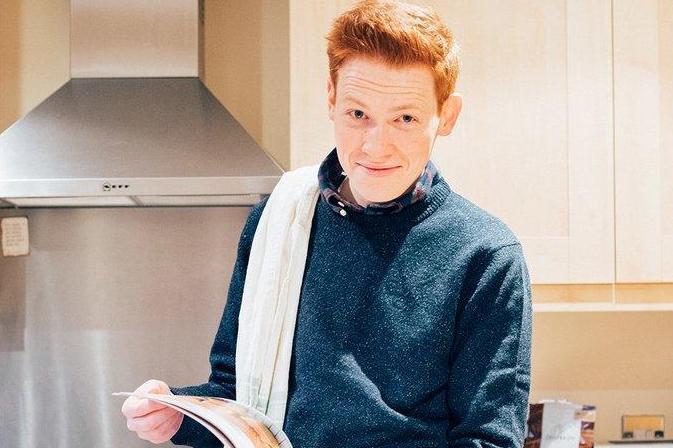Great British Bake Off finalist Andrew Smyth on Channel 4, male bakers and the secret to creative cakes
“Sometimes change is exciting”

Andrew Smyth made his way into the hearts of the nation on last year’s Great British Bake Off with his animated facial expressions, creative bakes and Northern Irish lilt (certain viewers were known to swoon every time he said the word ‘elderflower’).
Alongside Jane Beedle and eventual winner Candice Brown, Andrew baked his way to the grand final, which for many was particularly poignant after it was announced that this was the final series of Bake Off on the BBC before the programme was bought by Channel 4.
It was within the first few weeks of the latest series airing that the announcement was made, but at the time of filming, none of the contestants had any idea.
“We found out at the same time as the audience at home,” Andrew told The Independent.
“When we were in the tent, we were so busy focussing on the next bake and we had no clue what was going on behind the scenes,” he explains.
Much like everyone else, the contestants were surprised by the news. However, the ever enthusiastic Andrew remains positive about the award-winning TV show’s transition.
“Sometimes change is exciting,” he says. “It’s easy to jump on board a bandwagon and say it’s going to be one way or the other, but I personally am keen to see what Channel 4 do with it. The production company’s staying the same so why would you change a winning formula?”
Andrew’s time in the tent saw him wow the judges with his incredibly well-engineered bakes - most notably, the rotating pies.
Since Bake Off, however, the 25-year-old Cambridge graduate from County Down has continued working for Rolls Royce in Derby, where he designs jet engines.
But in order to make the most of the opportunities that have come his way since Bake Off, Andrew now works four days a week in his role as an aerospace engineer, freeing up time for baking-related activities.
“It’s kind of like juggling two jobs at once,” he says. “I’m trying to strike the right balance but am really keen to make the most of all the opportunities that are coming out of Bake Off. It’s allowed me to do a lot of exciting things that I’d never have got to do beforehand.”
One of which opportunities saw Andrew baking a cake for the Duke of Cambridge when he visited Rolls Royce.
Most ingeniously and appropriately, Andrew created an edible jet engine for the Duke, complete with rotating gingerbread blades.
“I think they took a smaller version of it back with them to Kensington Palace in the chopper,” Andrew says, understandably proud of the honour.
Although he loves baking, he’s equally passionate about engineering.
“I love it when I get to combine baking and engineering, but what I really want to do is get into science broadcasting,” he says.
Andrew’s passion for getting the next generation interested in science is clear - he talks enthusiastically about showing how fascinating engineering can be, peppering his sentences with “really”, “passionate” and “love”.
He says that “taking engineering to the mass population” would be “the ultimate dream,” and wants to stop children forming stereotypes of what an engineer looks like.
“The problem is people form assumptions so early. If you ask young kids in schools what an engineer looks like, they give you almost scripted answers.
“You can do anything you want. Engineering - and anything, really - is for everyone. You can’t count yourself out just because you’re a certain gender or background.”

I ask Andrew whether he ever thinks about gender stereotypes in baking - traditionally, women make cakes and men bake bread.
“When I look at baking I rarely consider what's manly or not - I love making everything from delicate cupcakes to massive loaves,” he says.
“I’m never going to be the best bread-maker but I can be good across the board and that worked out pretty well for me.”
It’s the approach he takes to life too, combining engineering and baking with a spot of music on the side.
“People often constrain themselves and say ‘I’m an engineer, I can’t do that,’ but why can’t I do that? I’m just going to give it a go, if it works out, it works out, if not I’ll just go and do something else.”
But Andrew seems to have plenty on his plate at the moment - he’s baking at several festivals over the summer, including Maker Faire UK at Life Science Centre in Newcastle, a two-day celebration of hacking, crafting, coding, DIY and garden shed inventing at the beginning of April.
It’s here that Andrew will be demonstrating a secret science-themed bake, showing off his unique baking skills.
Andrew Smyth’s top tips for creatively-engineered bakes:
1. Planning is key
We regularly saw Andrew on Bake Off with detailed hand-drawn diagrams guiding him through his bakes.
2. Measure everything carefully
Precision is crucial in both scientific experiments and baking.
3. Question your assumptions
“Asking yourself ‘what if?’ is a catalyst for creativity and often that was what happened on Bake Off for me,” Andrew explains. Ask yourself what you’d love to make in an ideal world if anything was possible and go from there.
4. Find your problem
Having a problem to solve often gets your creative juices flowing, according to Andrew: “Often my best ideas come out of being stumped on how to do it.”
5. Trial and error
It’s so easy to just throw in the towel when something goes wrong but you should embrace it. “I don’t think I’ve ever made anything that’s gone perfectly to plan the first time. That’s the nature of experimenting.”
Fortunately he has a lot of hungry housemates.
Join our commenting forum
Join thought-provoking conversations, follow other Independent readers and see their replies
Comments
Bookmark popover
Removed from bookmarks